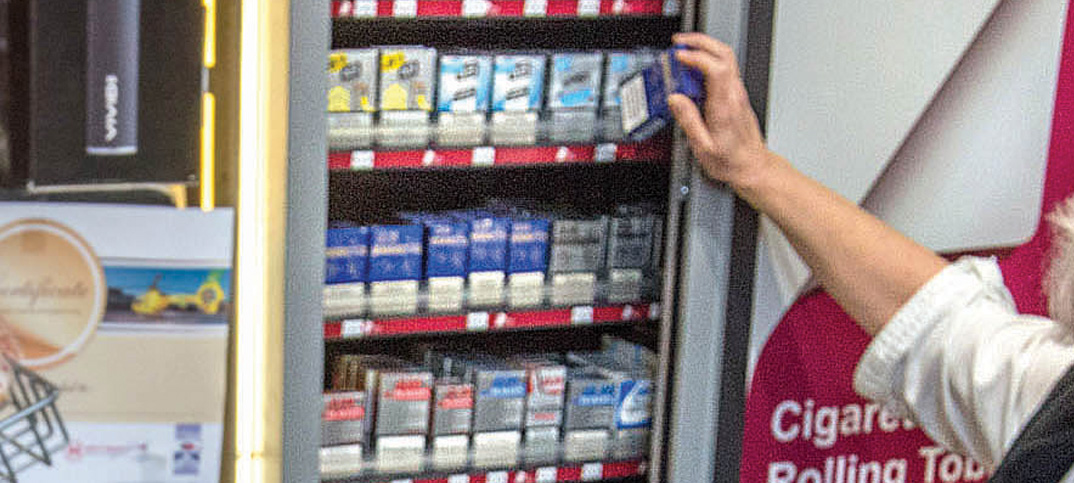Small retailers do not need tobacco sales to stay afloat, the health lobby’s latest research has claimed – but retailers are arguing it’s “too early to give up on tobacco”.
According to Action on Smoking and Health (ASH), independent stores make an average weekly profit of £242 on tobacco products; ASH’s report claims that this is less than 10% of the average convenience retailer’s total revenue.
While the group acknowledged that almost half of smokers purchased tobacco products in convenience stores, ASH argued that this benefited manufacturers, not retailers.
“It is essential to the tobacco industry that a lot of effort is put into persuading retailers to [continue selling its products],” said ASH chief executive Deborah Arnott.
“[However] tobacco is a high-cost, low-profit product, and money spent on tobacco is money not available for more profitable purchases. Our report invites retailers to see the long-term decline in smoking as an opportunity, not a threat.”
It was noted that the average profit margins for tobacco products were 6.6%, while other categories saw an average margin of 24.1%. The study also found that 69% of retailers said they made small profits from tobacco sales.
However, retailers slammed the findings, claiming that tobacco products remained too significant to abandon.
Mahendra Jadeja, owner of Jardins Newsagent in Winchmore Hill, north London, said that while tobacco sales were declining, they were still significant enough to drive much needed footfall.
“I’m very surprised that ASH is making these claims,” he told Retail Express. “For most retailers I know, tobacco sales make up a minimum 30% of their takings.”
He acknowledged that sales were decreasing, but said 30% was “still a significant level”.
“Because of tobacco, people are attracted to the store and they buy other things – they definitely do in my store,” Jadeja said. “I don’t think that their claim is right whatsoever.”
Ferhan Ashiq of Day-Today in East Lothian, Scotland, also disagreed with ASH’s suggestion that retailers should give up on tobacco sales.
“Tobacco sales are still significant,” he said. “It’s too early to give up on them.”
Ashiq added that his tobacco sales had fallen from 38 to 30% of his total sales over the last two months.
“I believe there are three key factors causing this,” he said. “The latest price rise; the decline in price-marked-packs; and increasing pack sizes. Despite falling sales, I still see that there’s value in cigarettes – even if the margins are only 5 or 6%.”
Blackburn retailer and national spokesperson for the Tobacco Retailers’ Alliance Suleman Khonat questioned the ASH findings.
“Retailers sell tobacco because they are giving their customers what they want,” he said, pointing to research that found 90% of small retailers saw tobacco is an important product category.
“The fact is that tobacco makes up around 40% of turnover in many small stores, while 39% of convenience store shoppers are smokers. The annual revenue for a convenience store from a single tobacco shopper is £2,473, compared to £1,020 per year from a non-tobacco shopper. Without tobacco, additional purchases and footfall would simply not occur. ASH has chosen to ignore this key point.”
Khonat also questioned ASH’s involvement with the retail industry.
“It is beyond their health remit, and demonstrates a desire to see the end of small shops that sell tobacco,” he said.
However, Newcastle retailer John McClurey told ASH researchers that he had “little choice but to sell tobacco”.
“Many of my customers still smoke, but tobacco makes me very little money while tying up plenty of cash in stock,” he said.
“Tobacco is a burden to me. A better alternative for retailers is to reduce stock, shift the gantry and free up space for products that actually turn a decent profit.”
UPDATE
Following the report’s release, ASH held an official launch event at the Houses of Parliament, where Arnott admitted “it’s not yet realistic” for small retailers to completely pull tobacco from their shelves.
“We’re not saying retailers shouldn’t sell tobacco, we’re just saying it’s not in their best interests to stock it,” she said, before countering the argument that the illicit trade was driving down sales.
“The only way the tobacco industry can argue with new regulations is by suggesting that the illicit market has increased. In reality, counterfeit tobacco makes up a tiny proportion of the market.”
Yesterday, HMRC estimated that £2.4bn of duty was lost in 2015-16 to the illegal tobacco trade – up from £1.8bn the previous year.





Comments
This article doesn't have any comments yet, be the first!